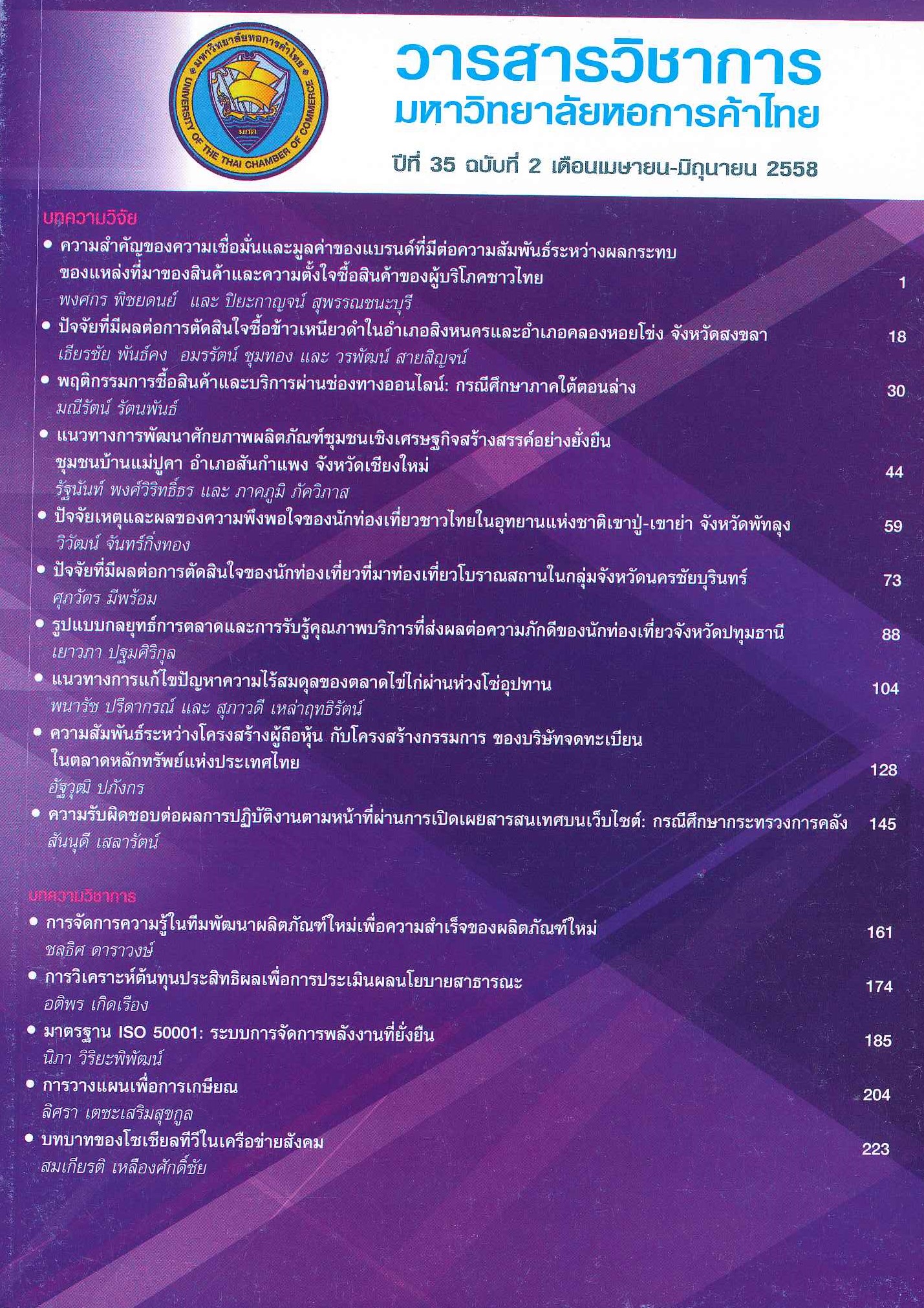Accountability through Information Disclosure on Websites: A Case Study of the Thai Ministry of Finance
Main Article Content
Abstract
This research explores accountability mechanisms in the Ministry of Finance, particularly through the information disclosure on websites. The sample group is nine government departments under the Ministry of Finance. Content analysis was conducted in order to analyse what information was disclosed on departmental websites.
The findings show that the information disclosed still has some problems with the issues of reliability, availability and timeliness. This affects the accountability relationship directly. Therefore, to enhance accountability in government departments, some improvements are needed, particularly regarding incentives, attitudes and motivations of both accountors and accountees influencing the accountability relationship.
Article Details

This work is licensed under a Creative Commons Attribution-NonCommercial-NoDerivatives 4.0 International License.
ลิขสิทธิ์ของบทความ
ผลงานที่ได้รับการตีพิมพ์ถือเป็นลิขสิทธิ์ของมหาวิทยาลัยหอการค้าไทย ห้ามมิให้นำเนื้อหา ทัศนะ หรือข้อคิดเห็นใด ๆ ของผลงานไปทำซ้ำ ดัดแปลง หรือเผยแพร่ ไม่ว่าทั้งหมดหรือบางส่วนโดยไม่ได้รับอนุญาตเป็นลายลักษณ์อักษรจากมหาวิทยาลัยหอการค้าไทยก่อน
References
Axworthy, T. 2005. The Accountability Ladder: Five Steps Toward Democracy [Online]. Available: https://www.wfda.net/UserFiles/ File/speeches/Axworthy.pdf
Ball, I. 2005. Achieving Greater Accountability in Government through Improved Public Sector Financial Reporting [Online]. Available: www.ifac.org/MediaCenter/? q=node/view/111
Barata, K., et al. 1999. Report to the World Bank infoDev Programme-From Accounting to Accountability: Managing Accounting Records as a Strategic Resource [Online]. Available: www.irmt. org/download/DOCUME-1/DEVELO-1/ RESEAR-1/ESCOR2.PDF
Behn, R. 2001. Rethinking Democratic Accountability. Washington, D.C.: Brookings Institution Press.
Bertók, J., et al. 2002. "Making It Happen: Developing Policy Guidelines for Accountability and Transparency.” in Bertók, J. (ed). Public Sector Transparency and Accountability: Making It Happen, pp. 37-50. Paris: OECD.
Birkinshaw, P. 2006. "Transparency as a Human Right." in Hood, C. and Heald, D. (eds). Transparency: the Key to Better Governance, pp. 47-57. Oxford; New York: Oxford University Press.
Bolívar, M., Pérez, C. and Hernández, A. 2006. “Cultural Contexts and Governmental Digital Reporting.” International Review of Administrative Sciences 72, 2: 269-290.
Bovens, M. 2005. "Public Accountability." in Ferlie, E., Lynn, L. and Pollitt, C. (eds). The Oxford Handbook of Public Management, pp. 182-208. Oxford: Oxford University Press.
Brinkerhoff, D. 2001. Taking Account of Accountability: A conceptual Overview and Strategic Options [Online]. Available: www.usaid.gov
Coy, D. and Dixon, K. 2004 "The Public Accountability Index: Crafting a Parametric Disclosure Index for Annual Reports.” The British Accounting review 36, 1: 79-106.
Coy, D., Fischer, M. and Gordon, T. 2001. "Public Accountability: A New Paradigm for College and University Annual Reports.” Critical Perspectives on Accounting 12, 1: 1-31.
Davis, J., Schoorman, F. and Donaldson, L.1997. "Towards a Stewardship Theory of Management.” Academy of Management Review 22, 1: 20-47.
Debreceny, R. and Gray, G. 1999. "Financial Reporting on the Internet and the External Audit.” European Accounting Review 8, 2: 335-350.
Dicke, L. and Ott, J. 2002. "A Test: Can Stewardship Theory Serve as a Second Conceptual Foundation for Accountability Methods in Contracted Human Services?” International Journal of Public Administration 25, 4: 463-487.
Dubnick, M. 2006. Orders of Accountability [Online]. Available: https://pubpages.unh. edu/dubnick/cv/cv.pdf.
Fischer, S. 1998. The Asian Crisis: A View from the IMF [Online]. Available: www.imf.org
Gray, S. J. 1988. 'Towards a Theory of Cultural Influence on the Development of Accounting Systems Internationally.” Abacus 21, 1: 1-15.
Hofstede, G. 1991. Cultures and Organizations: Software of the Mind. London: McGraw-Hill.
ljiri, Y. 1983. "On the Accountability-Based Conceptual Framework of Accounting." Journal of Accounting and Public Policy 2, 2: 75-81.
Marston, C., and Polei, A. 2004. "Corporate Reporting on the Internet by German Companies.” International Journal of Accounting Information Systems 5, 3: 285-311.
McMahon, L. 1995 "Corporate Accountability in Australia: Managing the Information Environment for Corporate Accountability.” Journal of Business Ethics 14, 8: 673-681.
McTigue, M., Roemer, T. and Ellig, J. 2005. 6th Annual Perfornance Report Scorecard: Which Federal Agencies Best Inforn the Public? [Online]. Available: www. mercatus.org/governmentaccountability/ category.php/15.html
Mulgan, R. 2000. “Accountability: An Ever-Expanding Concept?” Public Administration 78, 3: 555-573.
Mulgan, R. 2002. Accountability Issues in the New Model of Governance [Online]. Available: https://dspac.anu.edu.au/bitstream/1885/41731/3/mulgan.pdf
Pablos, J.L., et al. 2002. "The Annual Report as a Tool for Financial Disclosure in Local Governments.” International Journal of Management 19, 4: 651-663.
Phongpaichit, P. and Baker, C. 1995. Thailand: Economy and Politics. Oxford: Oxford University Press.
Power, M. 1991. "Auditing and Environmental Expertise: Between Protest and Professionalization." Accounting Auditing and Accountability Journal 4, 3: 30-42.
Prat, A. 2006. "The More Closely we are Watched, the Better we Behave?” in Hood, C. and Heald, D. (eds). Transparency: the Key to Better Governance, pp. 91-103. Oxford; New York: Oxford University Press.
Premchand, A. 1999. "Public Financial Accountability.” Asian Review of Public Administration 11, 2: 45-70.
Selaratana, S. 2009. "Accountability in the Thai Public Sector." Doctoral Dissertation, Department of Accounting and Finance, Faculty of Law, Business and Socialnces, University of Glasgow.
Sinclair, A. 1995. "The Chameleon of Accountability: Forms and Discourses.” Accounting, Organizations and Society 20, 2-3: 219-237.
Soontornpipit, P. 2002. Is a Culture of Accountability Developing in Thailand? [Online]. Available: www.ombudsman.go.th
Stewart, J. 1984. "The Role of Information in Public Accountability." in Hopwood, A. and Tomkins, C. (eds). Issues in Public Sector Accounting, pp. 13-34. Oxford: Deddington Philip Allan.
Suwanraks, R. 1999. "Summary of Discussion and Recommendations: The 1998 TDRI Year-end Conference: From Crisis to Sustainable Development.” TDRI Quarterly Review 14, 1: 10-20.
UN. 2004. Concept Paper 2: Transparency and Accountability in Public Financial Administration [Online]. Available: https://unpan1.un.org/intradoc/groups/public/ documents/UN/UNPAN007716.pdf
Vandergeest, P. 1993. "Constructing Thailand: Regulation, Everyday Resistance, and Citizenship.” Journal for the Comparative Study of Society and History 35, 1: 133-158.
Velayutham, S. and Perera, M. 2004. "TheInfluence of Emotions and Culture on Accountability and Governance.” Corporate Governance: International Journal of Business in Society 4, 1: 52-64.
World Bank. 1992. Governance and Development. Washington D.C.: World Bank.
Xiao, Z., Jones, M. and Lymer, A. 2002. “Immediate Trends in Internet Reporting.” The European Accounting Review 11, 2: 245-275.


